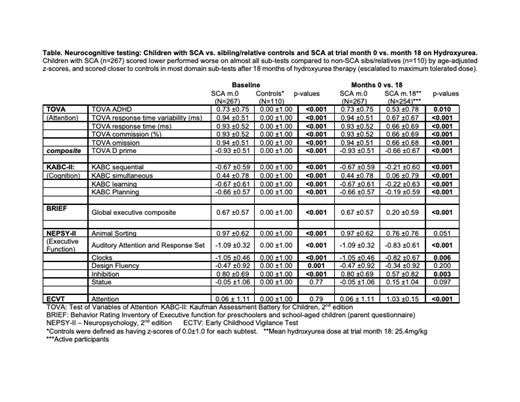Introduction: Cerebrovascular injury can lead to neurocognitive impairment in children with sickle cell anemia (SCA). The prospective impact of hydroxyurea therapy on neurocognitive function has not been previously reported in a large sample of children with SCA in sub-Saharan Africa. We assessed the impact of hydroxyurea therapy at the trial's18-month midpoint on neurocognitive function compared to baseline assessments and to non-SCA controls.
Methods: A sample of267 children with SCA, ages 3 to 9 years, were randomly selected for screening and enrollment from eligible patients who attended the Mulago Hospital Sickle Cell Clinic (MHSCC). BRAIN SAFE II is an open label hydroxyurea treatment trial with escalation to maximal tolerated dose. Primary outcomes are stroke, stroke risk and neurocognitive assessment. Controls were aged 3 to 12 years and siblings/relatives of participants with SCA.Attention, cognition and executive function were assessed for all participants by age-appropriate neurocognitive testing. Controlsestablished test z-scores for each age. Baseline (month 0) SCA group z-scores were compared to the controls and to the SCA sample at trial month 18.
Results: At trial baseline, SCA trial participants (n=267) were younger than the control group (mean age 5.1±1.7 vs. 7.1± 3.9 years, p<0.001), had lower weight-for-age ( p=0.03) and had similar socio-economic score and caregiver age and educational attainment. Participants had lower z-scores in attention (p<0.001) and neurocognitive ability (p<0.001), and in executive function ( p=0.001) in a total of 15 of 17 subtests. After 18 months of hydroxyurea therapy (mean dose 25.4mg/kg) for all active SCA participants (95.1%) (n=254), significant improvements in z-scores were seen at 18 months in attention ( p<0.001), all 4 subtests for cognitive ability ( p<0.001) and in 3 of 6 subtests of executive function ( p=0.003 to <0.001).
Conclusion: After 18 months of hydroxyurea therapy reaching MTD dosing, children showed significant improvements in attention and cognition, with more modest improvements in executive function. Their scores moved closer to those from non-SCA controls in most subtests. These findings suggest that hydroxyurea therapy may play an important role in enhancing overall neurocognitive function in children with SCA. Trial procedures are ongoing to assess the effects from longer-term therapy.
Disclosures
Green:AddMedica: Other: Donated study drug for an NIH-funded clinical trial.


This feature is available to Subscribers Only
Sign In or Create an Account Close Modal